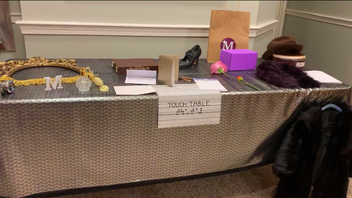Accessibility and Inclusion Efforts at the Walpole Footlighters!

This year, Footlighters has started on a journey of trying to make the theatre more accessible to all of our audiences. Cynthia Small, a longtime Footlighter, is heading up this initiative.
Cynthia is a local professional voice actor who has been involved with community theatre for over 20 years. Since the pandemic, she has trained and worked in Audio Description, with the intention to make theatre more accessible to people who are blind or have low vision. Part of how she has begun to bring this to Walpole is by having a touch table in the lobby for each of the shows of our present season.
A touch table provides blind or low vision audience members with a chance to physically examine and interact with the props that actors use onstage. To do this, Cynthia gathered props (or duplicates, when available) used in She Loves Me, A Christmas Carol, and The Mousetrap. She provided descriptions of when and how these items are used during the show, which is important for an audience member to know— many props onstage are vital to understanding what is happening in the plot, and being able to understand what they are and how they are used fills in context gaps that would otherwise be missing for an audience member who can't see them during the performance.
For example, as pictured below, the props that were on the touch table for She Loves Me were an old bottle of perfume—since the show takes place at a parfumerie in the 1930s, and these bottles were used frequently onstage—as well as a rose like the ones that Amalia and Georg used to try to find each other during their attempted (but ultimately disastrous) date.
Inclusivity measures like touch tables, audio description, and sensory-friendly performances are easier to find in larger or urban theatres, but in community theatre, it is currently less common. However, Cynthia describes a burgeoning and quickly developing area: “There are very active facebook and LinkedIn groups that I belong to to share resources and questions. I have to say that people in this field are passionate about their work and have been more than willing to share their expertise. Now I am building the same kind of network in live theater.”
Our hope is that touch tables and audio description (which will be featured in next month's newsletter!) are just the beginning for the Footlighters.
Pictured above: The touch table from She Loves Me
We invite you to click our donate tab and make a donation to go towards our continued efforts with accessibility and inclusion!
Cynthia is a local professional voice actor who has been involved with community theatre for over 20 years. Since the pandemic, she has trained and worked in Audio Description, with the intention to make theatre more accessible to people who are blind or have low vision. Part of how she has begun to bring this to Walpole is by having a touch table in the lobby for each of the shows of our present season.
A touch table provides blind or low vision audience members with a chance to physically examine and interact with the props that actors use onstage. To do this, Cynthia gathered props (or duplicates, when available) used in She Loves Me, A Christmas Carol, and The Mousetrap. She provided descriptions of when and how these items are used during the show, which is important for an audience member to know— many props onstage are vital to understanding what is happening in the plot, and being able to understand what they are and how they are used fills in context gaps that would otherwise be missing for an audience member who can't see them during the performance.
For example, as pictured below, the props that were on the touch table for She Loves Me were an old bottle of perfume—since the show takes place at a parfumerie in the 1930s, and these bottles were used frequently onstage—as well as a rose like the ones that Amalia and Georg used to try to find each other during their attempted (but ultimately disastrous) date.
Inclusivity measures like touch tables, audio description, and sensory-friendly performances are easier to find in larger or urban theatres, but in community theatre, it is currently less common. However, Cynthia describes a burgeoning and quickly developing area: “There are very active facebook and LinkedIn groups that I belong to to share resources and questions. I have to say that people in this field are passionate about their work and have been more than willing to share their expertise. Now I am building the same kind of network in live theater.”
Our hope is that touch tables and audio description (which will be featured in next month's newsletter!) are just the beginning for the Footlighters.
Pictured above: The touch table from She Loves Me
We invite you to click our donate tab and make a donation to go towards our continued efforts with accessibility and inclusion!
